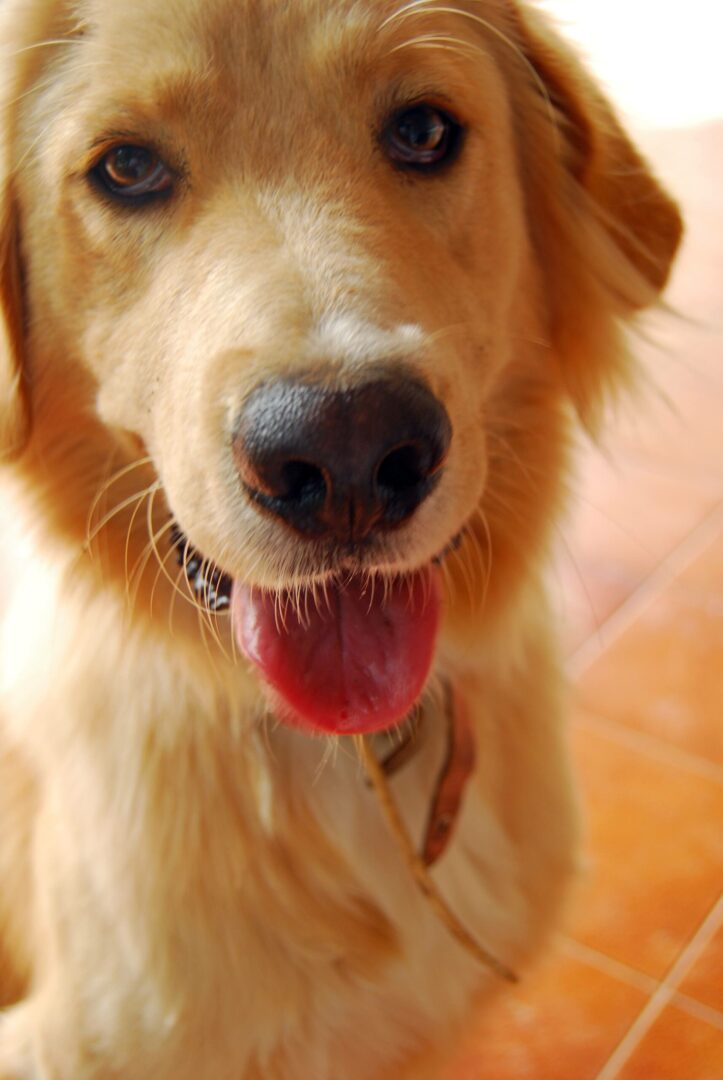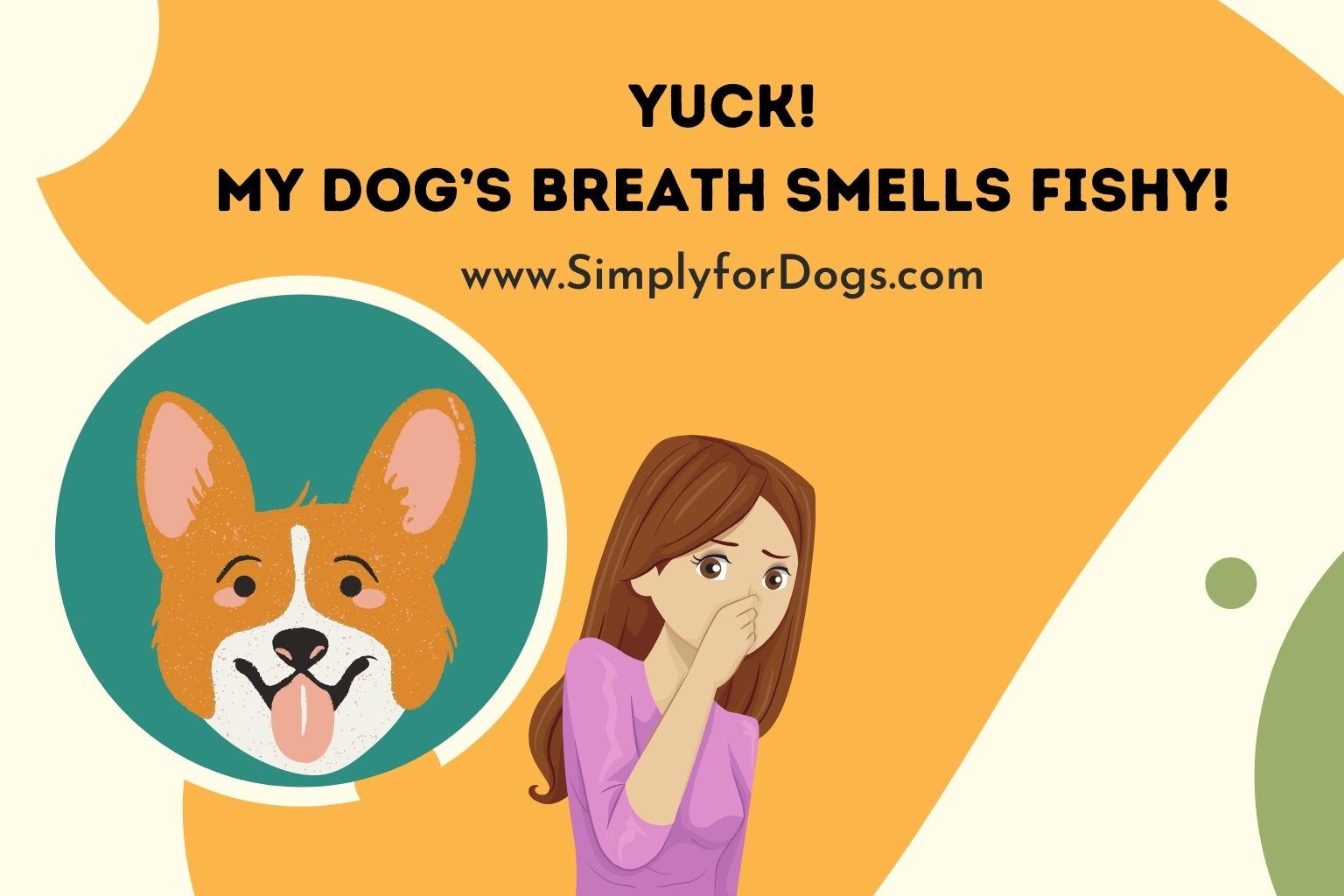Well, what can I say. Sometimes dog breath is pretty bad. Janice and Leroy usually don’t have breath that is all that horrible, but for sure I’ve heard from other people who have just gone “Whew!” Awful, awful dog breath.
Dog Digestive Vitamins On Amazon
Last update on 2024-03-07 at 23:12 / Affiliate links / Images from Amazon Product Advertising API
Bad dog breath, of course, comes in a variety of unique stenches. One of the worst, of course, occurs when your dog has found some lovely poo, or perhaps another dog’s vomit to chow down on. And although none of my dogs have ever had it, I’ve heard enough people talk about fishy dog breath to have become curious about it, so I began doing a bit of research, and I’m about to share the results of that research with you.
The Most Common Cause for a Dog’s Fishy Breath
So, why would your dog’s breath smell fishy? And how are you going to deal with it?
The most likely cause of your dog’s bad breath is that his teeth haven’t been brushed often enough – bacteria has built up, and his teeth are not clean. Bacteria can also build up under the gum line, and when this happens, dogs are every bit as susceptible to bad breath as humans.Plaque and tartar can also build up and cause undesirable odors.
People often don’t realize, too, that dogs are equally susceptible to gum disease. Much of the time you can ward it off with chewies and regular brushing, but the fact is that if your dog should also have regular, professional cleanings just as humans do.

Professional cleanings can often be done by your regular veterinarian. There are also veterinary dentists who specialize in canine tooth and gum care. In the meantime, brush your dog’s teeth every day if possible, or at least three times a week. There are a number of good pet toothpastes on the market that come in flavors that are pleasing to dogs. The bottom line is, your dog’s breath does not have to smell fishy.
Related Content:
How Your Puppy Smells, Sees and Hears
3 Amazing Things about Dogs and Their Sense of Smell (Video)
8 Dog Odors and How to Banish Them for Good (Video)
Why Fish, Though?
Often, the reason your dog’s breath smells fishy actually comes from the other end of the dog. It’s a fact of life that your dog is going to lick his butt – if anyone knows of a way of stopping this kind of behavior, I’d love to know about it!
The thing is, when your dog licks his butt, if his anal glands are not emptied, then he can end up with fishy breath. The anal sacs, if they’re working properly, will excrete fluid when your dog defecates. If the anal glands are blocked up and not emptying correctly, the fluid builds up, becomes impacted, and then an infection results. This could very well be the reason for your best buddy’s disgusting breath.
As you have no doubt determined from the word “infection,” your dog’s fishy breath in this case is not the main problem. The bigger issue is that your dog is in discomfort. Impacted anal glands aren’t going to cause your dog to be in agony, but they’re no fun either. This could be why your dog is licking is butt. You might also notice that he’s “scooting” – sitting down and dragging his butt. Often, dogs will do this if they’re wormy, but it can also be in an attempt to un-impact the anal sacs.
Correcting the Problem
Fortunately, fishy breath is usually fairly easy to correct. However, you need to first determine the cause of the problem. If it’s simply that his teeth aren’t being properly cleaned, get a soft toothbrush and some pet toothpaste and get to work. If his anal glands need to be expressed, that’s easily taken care of as well. More on that in a bit. Bad breath can have other, more serious causes – your dog could have worms, or even liver or kidney disease. So, if the bad smell persists or gets worse, it would be wise to take your dog to the vet for a proper diagnosis and treatment.
Talk with your vet and find out if the anal glands need to be expressed. As previously mentioned, most dogs do a perfectly good job of expressing the glands on their own – it’s a natural result of defecation. If the glands do get backed up, though, the dog may need help expressing them. This is something that shouldn’t be done too often – most dogs only need the treatment once or twice. If it’s done too frequently, it can actually aggravate the problem rather than correcting it, so your vet will want to proceed with caution.
Once the anal glands have been expressed, your dog’s breath will still smell fishy for a while. However, eventually the offensive smell will dissipate.
How Squeamish Are You?
How comfortable are you with getting up close to your dog’s butt? Personally, I have very few qualms about butt contact, mainly because Janice typically sleeps on the pillow next to me, her butt close to my face, and farts frequently through the night. If she ever needed to have her anal glands expressed, I expect I could do it without even gagging.
Of course not everyone has that kind of butt tolerance level, so if you don’t, the job might be best left to your vet. If you think you can handle the job, though, keep in mind that some situations will require veterinary assistance. As an example, if an abscess (a fluid-filled lump) is present, it will have to be lanced. Then, your dog will be given a course of antibiotics for a week or two.
If your dog seems uncomfortable when you approach his hindquarters, or if you see any blood or pus, then don’t try to express the anal glands. Instead, get in touch with your vet right away. There could be a serious problem that is not going to be corrected by simply expressing the glands.
Now, if it is just a matter of expressing the anal glands if your dog’s breath smells fishy, how it’s done will depend on the size of the dog. If you have a big dog, you’ll do it from a kneeling position, facing his butt. If you have a small dog, you will probably be more comfortable if you place him on a table or countertop.
This is going to be a two-person job, so have someone who knows your dog restrain him gently. This person will put one arm around the dog’s neck, and the other around the body. It’s kind of like a hug, and it will prevent your dog from squirming while you express the glands.
You don’t want to go into this job bare-handed, and you also don’t want to transfer germs to your dog, so put on a pair of thin latex gloves. Then, lubricate your finger with petroleum jelly or a water-based lubricant. Lift up the tail, and very gently place the tip of your finger into your dog’s butt, to a depth of about an inch. It’s very important to be gentle – you can imagine how you would feel if someone were doing this to you, so proceed accordingly and make every effort not to cause pain. Now, find the glands. You should be looking somewhere between the 7-o’clock and 5-o’clock positions. When you locate a gland, it should feel something like a marble in a large dog, or a pea in a small dog.
Once you find the gland, put a paper towel or a clean cloth between the dog’s butt and your hand, and gently press on the far side of the gland while squeezing in your direction. To get an idea of how much pressure you should be applying, imagine the way it feels when you press on your closed eyelid – use no more pressure than necessary, and of course don’t go beyond the level of pressure that would cause your eyeball to hurt.
Do this for both glands. By the time you finish, the glands should be empty. You won’t find much fluid on the towel, but you’ll know that you’ve gotten it right if the dog stops “scooting” and the fishy smell goes away eventually.
Again, if your dog’s breath smells fishy due to impacted anal glands, don’t make a habit of expressing the glands. It can cause more harm than good, and sometimes it even causes further impaction, leading to greater discomfort for the dog.
What if the Dog’s Breath Still Smells Fishy?
If the anal glands have been properly expressed, the dog’s fishy breath should clear up in about a week. If it comes back sooner, though, it could be that the glands are constantly backing up. If this is the case, your vet will probably recommend a high-fiber diet. The purpose of such a diet is essentially the same as it is for humans – to create a bulkier stool. This puts more pressure on the anal glands when the dog defecates, and essentially causes the anal glands to do their job more effectively.
If the problem still persists, the vet may suggest an anal sacculectomy, which is a procedure that is done to remove the dog’s anal glands. It is fairly minor surgery, with few possible complications. Some dogs become incontinent following the procedure, but this is rare.
Related Content:
How Your Puppy Smells, Sees and Hears
3 Amazing Things about Dogs and Their Sense of Smell (Video)
8 Dog Odors and How to Banish Them for Good (Video)
The Final Word
If your dog’s breath smells fishy, it is very often an indication that he needs better oral care. If the smell gets worse, it could be a sign of serious illness, although it is more likely that the dog’s anal glands simply need a bit of help expressing fluid. The problem could simply be in the mouth, or it could be occurring on the other end of the dog. Either way, fishy breath can be the result, and either way, you can usually correct the problem without veterinary intervention.
Dog Digestive Vitamins On Amazon
Last update on 2024-03-07 at 23:12 / Affiliate links / Images from Amazon Product Advertising API
If you suspect that the problem is due to something worse than dirty teeth or backed-up anal glands, don’t hesitate to get in touch with your vet. I never feel, when it comes to my dogs, that I’ve wasted money if I’ve booked a veterinary consultation only to be told that there’s nothing wrong. Where your dog’s health is concerned, it’s always best to err on the side of caution.


